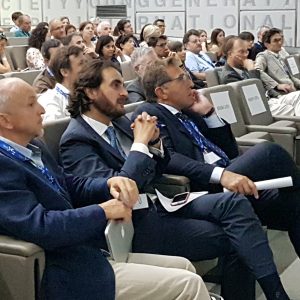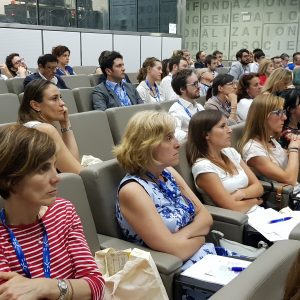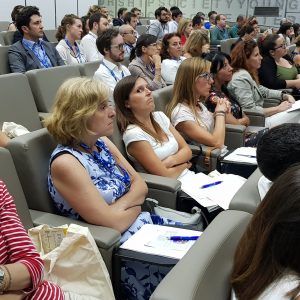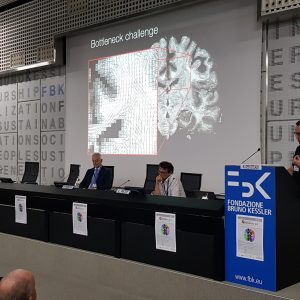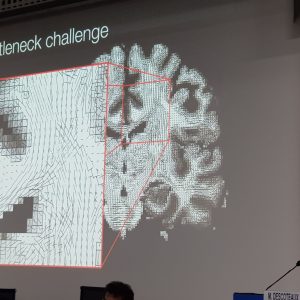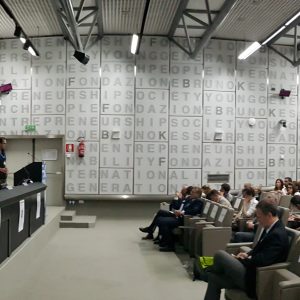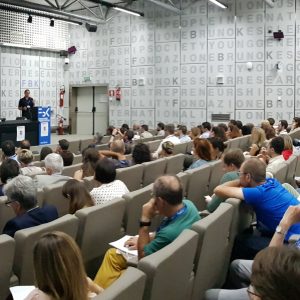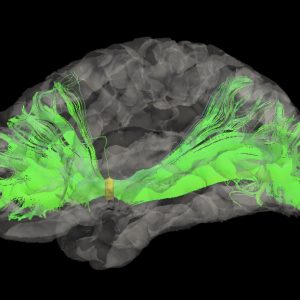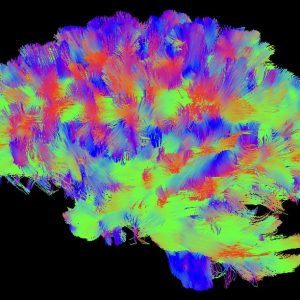Brain cancer: patient-friendly technology for a better quality of life
The top international experts in neuroscience and neuro-oncology surgery will be in Trento June 20 to 22 for "Connect Brain - Vol 2"
A real technological revolution is taking place in neuro-oncological surgery: the new techniques allow brain tumors (gliomas) to be removed while preserving cognitive functions to the benefit of patients’ quality of life. Today, it is possible to plan surgery taking into account the brain connections of patients, who recover better and faster thanks also to innovative neuro-cognitive rehabilitation techniques (such as brain magnetic stimulation). During surgery, the patient is awake (under local anesthesia) and the surgeon operates based on the map of brain connections (connectome) obtained in the intra-operative phase and through the functional magnetic resonance. This will be discussed at the international conference “Connect Brain vol. 2”, organized by the Department of Neurosurgery of the Trento Province Healthcare System in cooperation with Fondazione Bruno Kessler and TrentinoSalute4.0. Connect Brain – which will take place at FBK’s Povo hub June 20 through 22 and will see the discussion among the top international experts in neuroscience, neuro-oncology surgery and cognitive rehabilitation – was presented today in the presence of the Province councilor for health, social policies, disability and family Stefania Segnana, the director general of Apss (Trento Province Healthcare System), Paolo Bordon, the director of the Neurosurgery Department Franco Chioffi, co-director of the course together with Silvio Sarubbo, neurosurgeon of the Santa Chiara hospital in Trento, Paolo Avesani, Head of the NILab, joint Laboratory of Fondazione Bruno Kessler and the University of Trento and Stefano Forti, head of the FBK “Health and Wellbeing” research line team. “Connect Brain” is a theoretical-practical course that provides an updated overview on the tools and concepts deriving from research in the field of neuroscience and on the most reliable mapping and monitoring techniques used in brain surgery.
Technological evolution is therefore changing the approach of brain cancer surgery, with experts working to perform the surgery (resection) based on each patient’s needs in the difficult balance between greater survival and good quality of life.
“Once again our region, where excellence in the scientific field has the opportunity to express itself and develop to the fullest, is hosting an event of great importance for medicine, surgery and cancer treatment,” councilor Segnana stressed. “After the first edition in 2015, Trento is hosting again experts able to operate on patients under local anesthesia: an approach that opens up unheard-of possibilities, not only for cancer treatment, but also for other brain pathologies and more generally for the rehabilitation of various neurological pathologies. Events such as Connect Brain – Segnana finished – help to intensify the exchange of knowledge with extremely positive aspects”.
“Thanks to the valuable work of the Neurosurgery Department – Apss Director Bordon emphasized – today we have the opportunity to host in Trento the leading international experts in neuroscience and neuro-oncology surgery, who will provide us with an overall and in-depth look on new brain mapping techniques, capable of opening up new avenues for surgery. Starting from here, a virtuous circle can be generated in which the application of innovative methods improves, on the one hand, the medical-surgical outcomes and, on the other hand, provides valuable information to generally increase the skills and planning capacity of increasingly more complex surgery”.
The directors of the second edition of Connect Brain have revealed the technical-scientific details of the topics that will be looked at in depth during the conference. “The mapping of the functional brain structure, through pre-operative neuropsychological assessments and functional MRI, has revolutionized the surgical approach to neurological tumors, especially gliomas”, Franco Chioffi explained: “awake surgery is a consolidated technique that allows the removal of intra-cerebral tumors, awakening the patient with good pain control, for performing tests that allow greater safety in the preservation of the monitored cerebral functions, and thus with a better result for the patient”.
“Modern oncological neurosurgery – Silvio Sarubbo pointed out – no longer has the only goal of removing the tumor, but of removing the mass while preserving cognitive function, such as language, understanding, memory, and executive capacity on which the quality of life of the patients depends”. Thanks to the plastic capacity of the brain – Sarubbo went on – it is possible to set up a multi-stage surgery: “the neurosurgeon may not remove all the tumor so as not to compromise functionality. Relying on the brain’s ability to reorganize itself, it can then plan further surgery at a later time, to complete the resection, always with the aim of minimizing the risk of cognitive deficit”.
Paolo Avesani (FBK’s NiLab) focused instead on the more practical aspects of the Connect Brain three-day event: real laboratories that will allow neurosurgeons to experiment with new methods and tools offered by “neuroinformatics” to support neurosurgy, such as neuroimaging that helps characterize brain connectivity.
So, Connect Brain aims to provide an updated overview on the tools and concepts coming from research in the field of neuroscience and on the mapping and monitoring techniques used in brain surgery. With focus also on neuro-cognitive rehabilitation through the solutions of epilepsy surgery and vascular neurosurgery. (Vt/ml/mg)
In the attachments on the side:
– press release + scientific analysis sheet
– interviews with the main speakers and experts in neuroscience and neurosurgery.
The figures of the Neuroinformatics Laboratory are authorized for publication
